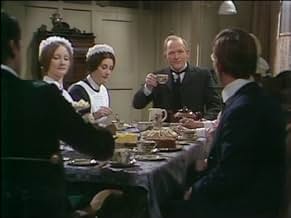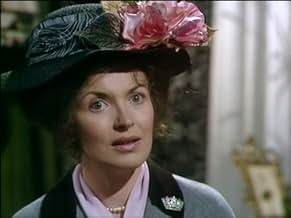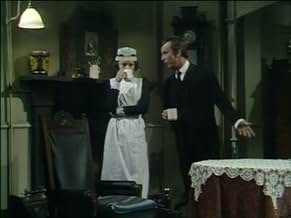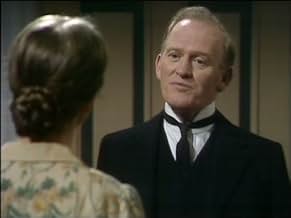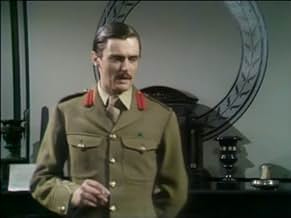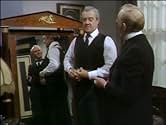IMDb RATING
8.4/10
3.8K
YOUR RATING
The lives and fortunes of the Bellamy family and their below-stairs servant staff at 165 Eaton Place play out against the social, political and historical backdrop of Edwardian London from 1... Read allThe lives and fortunes of the Bellamy family and their below-stairs servant staff at 165 Eaton Place play out against the social, political and historical backdrop of Edwardian London from 1903 to 1930.The lives and fortunes of the Bellamy family and their below-stairs servant staff at 165 Eaton Place play out against the social, political and historical backdrop of Edwardian London from 1903 to 1930.
- Won 7 Primetime Emmys
- 14 wins & 20 nominations total
Browse episodes
Featured reviews
I first viewed this series in the 1970's on PBS and have taken up the habit again. It is just so entertaining and classy that I can't shake my addiction to this wonderful period drama. Sadly, most of the actors have passed, only the younger ones are still alive. But that doesn't reduce the rich legacy of the whole cast. During the five seasons of this series, viewers witness the evolution of an aristocratic London family from 1901 to the early 1930's.
We journey with the family upstairs and their downstairs staff through many of the pivotal events of the era: the Titanic disaster, the Great War, the clash between labour and wealth, the market crash and depression. Not all the episodes are riveting but most of them kept this viewer transfixed to the screen. Lord and Lady Bellamy, performed by David Langton and Rachel Gurney, are the main characters upstairs as the series begins. Richard Bellamy is a Member of Parliament; Lady Marjorie, who comes from the landed gentry, oversees the staff with grace and a strict code of behaviour. She has her society friends and Lord Bellamy comes in touch with the leading figures of the day, from Lloyd George to Churchill. We even watch the family welcome Edward VII, the King of England, whose visit is punctuated by a servant giving birth.
Downstairs is dominated by the butler Angus Hudson, performed by Gordon Jackson, as an upright, no-nonsense Scot who runs the household with admirable efficiency and strict discipline. Angela Baddeley is the cook, a true perfectionist in the kitchen who tolerates no insubordination. If things go wrong, she can become unhinged until Hudson steps in to calm her down. Jean Marsh, who conceived the series with Eileen Atkins, is the head parlourmaid, Rose. Rose typifies many of the changes going on in her world and manages to be a friend and confidante to characters upstairs and down. Atkins never did appear...more the pity, but with the rest of this stellar cast, the series always sparkled anyway.
The cast changes as time passes and some remain to the end. Some characters with minor roles rise in prominence and more prominent ones disappear or recede. In this respect, it resembles family life in any era. The audience feels like a fly on the wall over the period as we see the intimate details of the lives of characters upstairs and down amid the changing face of British society. When the series ends, we feel the loss of the characters but with a great sense of satisfaction for knowing them and the world in which they lived.
We journey with the family upstairs and their downstairs staff through many of the pivotal events of the era: the Titanic disaster, the Great War, the clash between labour and wealth, the market crash and depression. Not all the episodes are riveting but most of them kept this viewer transfixed to the screen. Lord and Lady Bellamy, performed by David Langton and Rachel Gurney, are the main characters upstairs as the series begins. Richard Bellamy is a Member of Parliament; Lady Marjorie, who comes from the landed gentry, oversees the staff with grace and a strict code of behaviour. She has her society friends and Lord Bellamy comes in touch with the leading figures of the day, from Lloyd George to Churchill. We even watch the family welcome Edward VII, the King of England, whose visit is punctuated by a servant giving birth.
Downstairs is dominated by the butler Angus Hudson, performed by Gordon Jackson, as an upright, no-nonsense Scot who runs the household with admirable efficiency and strict discipline. Angela Baddeley is the cook, a true perfectionist in the kitchen who tolerates no insubordination. If things go wrong, she can become unhinged until Hudson steps in to calm her down. Jean Marsh, who conceived the series with Eileen Atkins, is the head parlourmaid, Rose. Rose typifies many of the changes going on in her world and manages to be a friend and confidante to characters upstairs and down. Atkins never did appear...more the pity, but with the rest of this stellar cast, the series always sparkled anyway.
The cast changes as time passes and some remain to the end. Some characters with minor roles rise in prominence and more prominent ones disappear or recede. In this respect, it resembles family life in any era. The audience feels like a fly on the wall over the period as we see the intimate details of the lives of characters upstairs and down amid the changing face of British society. When the series ends, we feel the loss of the characters but with a great sense of satisfaction for knowing them and the world in which they lived.
Having first watched this series as a mere boy of 10 years in the early 70's, it is indeed a pleasure to see it being repeated on UK cable TV as I write.
To me, it has lost none of it's charm and appeal, particularly the richness of characters, characters which were allowed to develop fully over the period it was screened.
If you haven't seen this, make an effort to do so - it was and is one of the most beautifully written and acted British drama series to grace the screen.
To me, it has lost none of it's charm and appeal, particularly the richness of characters, characters which were allowed to develop fully over the period it was screened.
If you haven't seen this, make an effort to do so - it was and is one of the most beautifully written and acted British drama series to grace the screen.
I have just bought the whole 5 series on DVD and am currently watching them all, especially the first two series which i never saw on their first showing. The series has not dated and is just as powerful as when it was first shown. Pauline Collins was a revelation as the sassy housemaid. I had only ever seen her before in the strange sitcom 'No Honestly,' in which she again co starred with real life husband John Alderton. They also starred in 'Thomas and Sarah' and the environmentally aware series 'Forever Green.'
It wasn't a huge budget that made this series great, immensely popular, much honored, and the biggest hit in PBS history. It was the fabulous writing and the rich characterizations presented to us every week. All these people we cared about, even negatively in the case of James. And that's why even now there is a U/D web site. Interwoven were the historical events of Edwardian England stretching through World War One into the Twenties. The series reached it's peak halfway through the war with "Women Shall Not Weep" - a magnificent episode available on video. By the Twenties the upper class was cracking more than the lower - a theme of the series. U/D was such a hit America tried its own hand at the wealthy/servants scenario with "Beacon Hill" - highly touted but dismally written flop. Special credits to Jean Marsh as Rose (who never found happiness, but wouldn't have been happy anyplace but the world she was brought up in!); Marsh also was a creator of the series. It was an absolute joy.
P.S. In case the credits don't reflect this, Daisy's last name was 'Peel".
P.S. In case the credits don't reflect this, Daisy's last name was 'Peel".
10lewis-51
My wife and I are just starting the fifth and last season. Last fall we started going through all the episodes on DVD in order. We do around 3 per week.
I never saw the series in the 1970s, though I heard of it. Some time in the mid 80s the local PBS station in New York showed most of them in order, a couple per week. I was absolutely enthralled. It's been about 20 years so we decided to have another look.
They absolutely stand up well. Better than well. I will emphatically repeat the judgment I made twenty years ago: this series is the finest thing that has ever been on television.
Yes, I know, you can't compare "apples and oranges" like that. I suppose the single ONE best thing that's ever been on television (in the sense of a one day or briefer event) in my experience was the moon landing in July 1969.
Still, in spite of that, all in all, if I had to pick, Upstairs-Downstairs is the best PROGRAM that has ever been on television. Far and away. If you are new to it, I envy you. I am already mourning the last episode, which I will see again in a few weeks at most. My only consolation is that in twenty years, I can watch it all again.
I never saw the series in the 1970s, though I heard of it. Some time in the mid 80s the local PBS station in New York showed most of them in order, a couple per week. I was absolutely enthralled. It's been about 20 years so we decided to have another look.
They absolutely stand up well. Better than well. I will emphatically repeat the judgment I made twenty years ago: this series is the finest thing that has ever been on television.
Yes, I know, you can't compare "apples and oranges" like that. I suppose the single ONE best thing that's ever been on television (in the sense of a one day or briefer event) in my experience was the moon landing in July 1969.
Still, in spite of that, all in all, if I had to pick, Upstairs-Downstairs is the best PROGRAM that has ever been on television. Far and away. If you are new to it, I envy you. I am already mourning the last episode, which I will see again in a few weeks at most. My only consolation is that in twenty years, I can watch it all again.
Did you know
- TriviaWhen Angela Baddeley went to Buckingham Palace to receive the C.B.E. (Commander of The British Empire) awarded to her in the Queen's 1975 New Year's Honour's List, she discovered that this was Queen Elizabeth's favorite television program and Mrs Bridges was her favorite character.
- GoofsHamish and Dorothy Matthews' names are spelt Mathews in the credits of episode 3.11 and Matthews in episode 4.6
- Quotes
Edward Barnes, footman: Arabella? That's a COW'S name!
- ConnectionsEdited into Upstairs Downstairs Remembered: 25th Anniversary (1996)
- SoundtracksThe Edwardians: Theme from Upstairs Downstairs
(uncredited)
Composed by Alexander Faris
[series theme tune]
Details
- Release date
- Country of origin
- Language
- Also known as
- Upstairs, Downstairs
- Filming locations
- 65 Eaton Place, Belgravia, London, England, UK(the Bellamys' house - 165 Eaton Place)
- Production companies
- See more company credits at IMDbPro
- Runtime
- 1h(60 min)
- Color
- Sound mix
- Aspect ratio
- 1.33 : 1
Contribute to this page
Suggest an edit or add missing content







